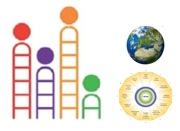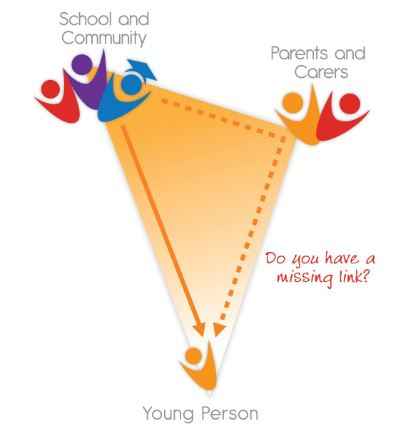Its not rocket science! An Adult-Child Wellbeing Approach to supporting young people with complex needs in any home or work setting, emphasises that there is a close relationship between the wellbeing and confidence of the adult and the wellbeing and progress of the young person.
An Adult-Child Wellbeing Approach is not however just a traditional parent training approach. An Adult-Child Wellbeing 'I Matter' Approach is a psycho-educational, community based learning experience. It starts from the premise that our children develop their social competence in systems or networks of relationships and proposes that if we want to improve the wellbeing of children in general and complex children in particular, then the evidence suggests that we must ensure that the widest possible systems are informed and sensitive to the needs of the developing child and to the relationships between key adults.
One of the most established research findings in the area of mental health and wellbeing is the importance and value of a secure attachment between a child and his/her key carers. Yet too many services become drawn into work with complex children without adequately supporting the key adults with the knowledge and support necessary to make a difference. The poster above was stimulated by this observation, that many well-meaning services say they want to support the child, but fail to grasp the importance of engaging with "The Missing Link" - the key adult or adults who have responsibility for the child on a day to day basis.
So how does an Adult-Child Wellbeing 'I Matter' Approach differ from traditional parent training?
It is not:
1. A quick add on or after thought - it is a planned, robust, long-term view
2. A quick fix to long-term challenges - it involves a sustained commitment to a new way of being
3. Magic dust that removes all conflicts and lets us live happily ever after
What it is:
1. An ACWB Approach is a framework based on well-established evidence about what young people need to develop and thrive.
2. An ACWB approach emphasises adult's key role and responsibilities for creating an atmosphere of wellbeing in a home or work or community setting. A child or children may offer the adult substantial challenges but it still remains the role of the adults to take the lead in creating the climate that they want.
3. An ACWB approach emphasises that given the scale of the mental health issues experienced by adults and by children in this country, individual therapy or even individual approaches are unlikely ever to be sufficient to address the scale of need. It argues therefore that because psycho-education and self-help has a long and robust evidence base for effectiveness good psycho-education should therefore be readily available as an intervention of choice for any organisation working with children but particularly with complex children and families. It is not a replacement for therapy which may sometimes be needed but it is a critical underpinning.
4. An ACWB 'approach is a community based psycho-educational approach and philosophy that emphasises supporting adults and young people in acquiring a well-evidenced knowledge base about brain development and child development and what children need to be able to develop wellbeing and good skills in emotional self-regulation, and how to help them gain these skills.
5. An organisation adopting an ACWB I Matter approach is one who makes a commitment to develop the understanding of staff teams as well as parents as it recognises the key significance of adult wellbeing behaviours and confidence, to the wellbeing of children, particularly the most reactive and the most complex. It is a firm, clear approach that promotes responsibility and accountability.
6. An ACWB Approach is a life-long approach that emphasises that as parenting in general is a challenging task that pushes all adults to grow and change, the parenting of any child with complex needs is a task that will push the adults involved to develop advanced skills. This a responsibility that is best understood prior to the child's birth, but can be learned at any age or stage.
7. As part of the personal development approach of an ACWB, I Matter approach. ACWB emphasises the importance of adult self-awareness, accountability for our own responses, and the development of skills in relationships and in relationship repair. There is a universality to this approach. We all can become dysregulated and can need support in becoming back in balance again. But it is never too late to acquire the needed skills that can make a big difference in a home or work setting.
8. An ACWB approach is therefore not just a 6-10 week package - it represents a language and philosophy that equips the community around stressed children or families to begin to observe, educate and support the responsible adults in becoming more skilled and confident themselves. The evidence suggests that there is a useful and robust direction to travel for any adult who wants to work for an atmosphere of wellbeing in their own home or work setting. This journey is one that we can all travel whatever has been happening. It is therefore universally applicable.
9. An ACWB approach is strongly in favour of proactive psycho-educational work to engage young people (adolescents) in learning about what young infants need to develop healthily, way before they first consider becoming a parent. This longer-term proactive approach to improving child health outcomes via psycho-education is much more than traditional sex education can offer.
When we look at mental health outcomes on an international basis it is quite clear that material possessions are not the primary determinant of mental health outcomes. If a child's emotional needs are met by key adults, he or she can learn to manage highly challenging situations with greater confidence. In challenging economic times therefore, psycho-education is even more important for the longer-term wellbeing of our children.
An Adult-Child Wellbeing Approach is not however just a traditional parent training approach. An Adult-Child Wellbeing 'I Matter' Approach is a psycho-educational, community based learning experience. It starts from the premise that our children develop their social competence in systems or networks of relationships and proposes that if we want to improve the wellbeing of children in general and complex children in particular, then the evidence suggests that we must ensure that the widest possible systems are informed and sensitive to the needs of the developing child and to the relationships between key adults.
One of the most established research findings in the area of mental health and wellbeing is the importance and value of a secure attachment between a child and his/her key carers. Yet too many services become drawn into work with complex children without adequately supporting the key adults with the knowledge and support necessary to make a difference. The poster above was stimulated by this observation, that many well-meaning services say they want to support the child, but fail to grasp the importance of engaging with "The Missing Link" - the key adult or adults who have responsibility for the child on a day to day basis.
So how does an Adult-Child Wellbeing 'I Matter' Approach differ from traditional parent training?
It is not:
1. A quick add on or after thought - it is a planned, robust, long-term view
2. A quick fix to long-term challenges - it involves a sustained commitment to a new way of being
3. Magic dust that removes all conflicts and lets us live happily ever after
What it is:
1. An ACWB Approach is a framework based on well-established evidence about what young people need to develop and thrive.
2. An ACWB approach emphasises adult's key role and responsibilities for creating an atmosphere of wellbeing in a home or work or community setting. A child or children may offer the adult substantial challenges but it still remains the role of the adults to take the lead in creating the climate that they want.
3. An ACWB approach emphasises that given the scale of the mental health issues experienced by adults and by children in this country, individual therapy or even individual approaches are unlikely ever to be sufficient to address the scale of need. It argues therefore that because psycho-education and self-help has a long and robust evidence base for effectiveness good psycho-education should therefore be readily available as an intervention of choice for any organisation working with children but particularly with complex children and families. It is not a replacement for therapy which may sometimes be needed but it is a critical underpinning.
4. An ACWB 'approach is a community based psycho-educational approach and philosophy that emphasises supporting adults and young people in acquiring a well-evidenced knowledge base about brain development and child development and what children need to be able to develop wellbeing and good skills in emotional self-regulation, and how to help them gain these skills.
5. An organisation adopting an ACWB I Matter approach is one who makes a commitment to develop the understanding of staff teams as well as parents as it recognises the key significance of adult wellbeing behaviours and confidence, to the wellbeing of children, particularly the most reactive and the most complex. It is a firm, clear approach that promotes responsibility and accountability.
6. An ACWB Approach is a life-long approach that emphasises that as parenting in general is a challenging task that pushes all adults to grow and change, the parenting of any child with complex needs is a task that will push the adults involved to develop advanced skills. This a responsibility that is best understood prior to the child's birth, but can be learned at any age or stage.
7. As part of the personal development approach of an ACWB, I Matter approach. ACWB emphasises the importance of adult self-awareness, accountability for our own responses, and the development of skills in relationships and in relationship repair. There is a universality to this approach. We all can become dysregulated and can need support in becoming back in balance again. But it is never too late to acquire the needed skills that can make a big difference in a home or work setting.
8. An ACWB approach is therefore not just a 6-10 week package - it represents a language and philosophy that equips the community around stressed children or families to begin to observe, educate and support the responsible adults in becoming more skilled and confident themselves. The evidence suggests that there is a useful and robust direction to travel for any adult who wants to work for an atmosphere of wellbeing in their own home or work setting. This journey is one that we can all travel whatever has been happening. It is therefore universally applicable.
9. An ACWB approach is strongly in favour of proactive psycho-educational work to engage young people (adolescents) in learning about what young infants need to develop healthily, way before they first consider becoming a parent. This longer-term proactive approach to improving child health outcomes via psycho-education is much more than traditional sex education can offer.
When we look at mental health outcomes on an international basis it is quite clear that material possessions are not the primary determinant of mental health outcomes. If a child's emotional needs are met by key adults, he or she can learn to manage highly challenging situations with greater confidence. In challenging economic times therefore, psycho-education is even more important for the longer-term wellbeing of our children.


Comments